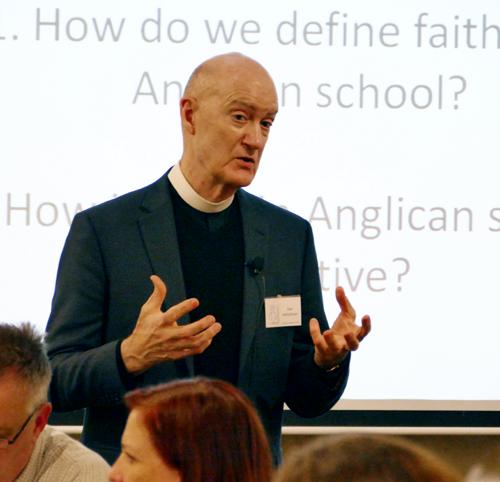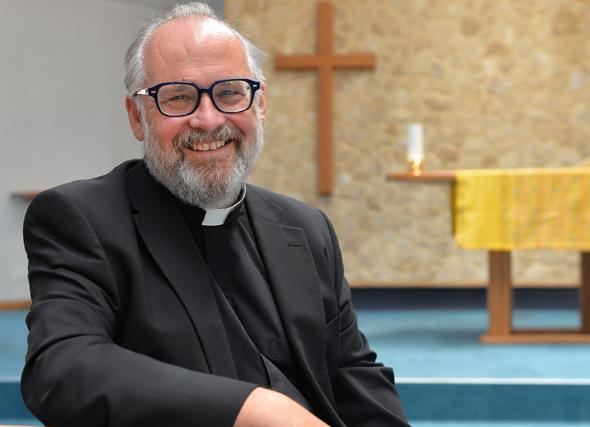
5 minute read
Christian Faith and Anglican Identity
By The Reverend Dr Duncan Reid, Head of Religious Education | Camberwell Girls Grammar School, VIC The world we’re preparing our students to live and work in is, among other things, a postsecular world. It’s a world in which religion is in the news every day in ways that might surprise those who’ve held the Enlightenment vision of ever-increasing progress and secularity. We no longer live in a Eurocentric world, and the non-European world is looking decidedly religious.
This is not always a good thing, of course. Instead of being a way of addressing and counter-acting our deep-seated human tendencies to exclusion and violence, religion can very easily be hijacked to become the vehicle of exactly those tendencies. Faith perspectives can easily become expressions of exclusive forms of identity, and the political agendas that flow from them. But in any case, the reality is that religious faith does not seems to be in danger of fading away. The view that religious faith is in conflict with scientific knowledge and an unfortunate delusion, but may nevertheless be socially useful, is looking decidedly oldfashioned.
A sympathetic observer of Anglicanism from outside our Anglican tradition is the contemporary German theologian Ulrike Link-Wieczorek. She discerns within Anglicanism two ‘Christological intentions’, an incarnational Christology and an ‘in-spirational’ Christology.
The first of these intentions, she argues in a wide-ranging survey of Anglican thought over the past 200 years, is to help us speak of God; the other to speak of the human Jesus, in the Spirit of God. The underlying aim in both tendencies is to ‘speak to those within, and those outside the church.’ We could see this second, ‘in-spirational’ intention as corresponding to the ‘invitational’ and ‘interactive’ strands in Anglicanism identified by Daniel Heischman in his address to the 2018 ASA forum.
Anglican identity is shaped, according to Prof. LinkWieczorek, by these two overlapping intentions, to speak both of the incarnate God and the human Jesus, and to speak to two similarly overlapping audiences: inside and outside the church. These audiences are very much part of our Anglican schools communities: we seek to catechise those who see themselves within the church.
We also welcome, without proselytising, those of other faiths or none. And we seek to guide and inform those of our students who are undecided as to where they stand in relation to Christian faith. This means that no one should feel excluded in an Anglican school, but everyone should feel encountered and invited, not simply though religious education but through the whole curriculum, by the living God who comes to us and offers us a new identity in Christ.
Daniel Heischman 2018 ASA Forum

of our incarnational focus. Anglicanism historically shows a kenotic, self-emptying tendency to cede power: think of the countless Anglican social initiatives that have grown beyond their church-based beginnings. Admittedly, power was not always given up willingly, nor was the result always an improvement, but these transitions were also never simply motivated by ‘tolerance’, but rather by a generosity of spirit and a growing respect for difference.
This respect for and embrace of difference is a large part of our Anglican story. Kenotic self-emptying is deeply rooted in the incarnational aspect of our Anglican identity, while at the same time we constantly hold before our students the man of Nazareth whose Spirit-filled birth, death and resurrection is an ongoing source of renewal, calling people from the most diverse of backgrounds and identities, calling them in the strangest and most unpredictable of ways, to a new life in communion with God.
It is this expression of Christian faith that Anglican schools at their best attempt to embody, through the whole scope of their curriculum and community lives. A part of our kenotic humility must be the recognition that we don’t always succeed in this endeavour. Sometimes, we have to admit, it is the opposite of such humility that blocks the way to succeeding.
But this should not prevent us from reversing outdated presuppositions about the world we live in, and state that Christian faith in its Anglican form is by no means in conflict with scientific knowledge, and that it points to a truth and a wisdom of ultimate importance but which is also by definition fundamentally ungraspable. It may not be socially ‘useful’, because it calls radically in question the competitiveness so valued in contemporary society. Instead it offers a very different understanding both of what is true and what is useful. Anglican schools will then offer our students, in an intergenerational exchange of understandings, the best of current knowledge and also the wisdom to discern how this knowledge is to be applied.

New Chaplain
Frederick Irwin Anglican School, WA
Frederick Irwin Anglican School’s new Chaplain, The Reverend James Tabor, has taken to his new role with enthusiasm and a passion for educating all students.
At his recent Commissioning, the former Royal Navy chaplain said the role of the chaplain was a unique one.
“To the outsider, the chaplain is the representative of God, the spiritual leader and the ‘life coach’ in a specific context. The chaplain is everyone’s friend and advisor, the confidant, the listener,” he said.
“This shares many characteristics with the pastor, the priest or the religious leader in wider society, but the chaplain is different, because of the context.
“Unlike the Church on the outside, the chaplain meets the community where they are, and works and lives alongside that community. Happiness, sadness, life and loves are shared, and hopes, dreams and successes are celebrated.”
Reverend James was most recently the Rector of the Parish of Pinjarra-Waroona and previously served as Chaplain in the Royal Navy for many years. He regularly shares his knowledge of and passion for the Defence Forces with students, particularly on significant days of remembrance such as ANZAC Day.
He is passionate about education and the development of faith and spirituality in young people as a means of building resilience, self-confidence and wholeness. Reverend James is looking forward to introducing a range of exciting projects and programmes for students and staff.
Reverend James has a degree from the University of Western Australia and trained for ministry at Oxford University, where he was awarded an Honours Degree in Theology. He also has a Masters Degree in Law. Reverend James is something of an amateur apiarist, enjoying beekeeping, along with sailing and reading. He is married and has three adult children.




